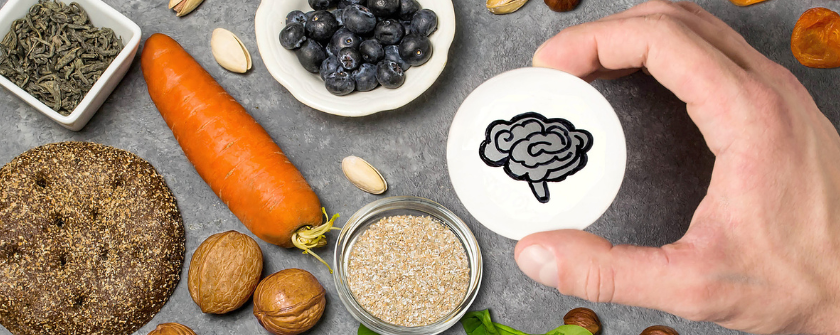Nutrition and Stress: What’s the Link and What Can You Do About It?

Stress is an inevitable part of life, affecting us in various ways, both physically and mentally. Recognising the role of nutrition in managing stress can empower us to make informed decisions that support our well-being. Let’s get started!
What is Stress?
Stress is the body’s natural response to perceived threats or challenges. When under stress, the body releases hormones like cortisol and adrenaline. This “fight or flight” response helps us respond effectively to immediate dangers. From an evolutionary perspective, stress is partly why we are still around as a species!
Different Types of Stress
Acute Stress: Acute stress is short-term and typically occurs in response to immediate challenges or threats. Examples of contemporary acute stressors include a near-miss accident, an unexpected, urgent deadline or your child’s extended tantrum.
Chronic Stress: Chronic stress is long-term, often the result of ongoing or recurring stressors such as work-related pressures, financial difficulties, or relationship problems. When experiencing chronic stress, you are on constant “fight or flight” mode, often due to “false alarm” threats. Unlike acute stress, which resolves quickly, chronic stress can have prolonged effects on your body and mind, increasing the risk of several health issues.
Effects of Stress on Physical and Mental Health
Physical Health: Σtress can have significant implications for physical health. Stress hormones cause dilated airways and increased blood sugar, heart rate and blood pressure; they also redirect blood flow to the muscles and away from the digestive system to prepare for physical action. Chronic or repeated exposure to stress can dysregulate the body’s stress response systems. This can lead to activation of inflammatory pathways and suppression of the immune system. Chronic stress can also contribute to insulin resistance through a combination of hormonal, metabolic, and behavioural mechanisms.
Mental Health: Stress can also impact mental well-being, contributing to anxiety, depression, and cognitive impairment. Acute stress may lead to feelings of anxiety or irritability. Chronic stress is associated with persistent mood disturbances, burnout, and an increased risk of developing mood disorders.
Stress and The Brain-Gut Axis
The brain-gut axis is a bidirectional communication between the brain and the gut, involving complex interactions between the central nervous system, the enteric nervous system, and the gut microbiota. Stress can have a profound impact on the brain-gut axis, triggering changes in gut motility, secretion, and permeability. It can also alter the composition of the gut microbiome causing a number of gastrointestinal disturbances. Conversely, signals from the gut can influence brain function and emotional well-being, influencing mood, cognition, and stress responses. This interplay between stress and the brain-gut axis highlights the importance of a holistic approach to health, recognising the connection between mental and gastrointestinal well-being.
How Stress Affects Diet
Now, let’s explore how stress impacts eating patterns.
Increased or Decreased Appetite: In acute stress, most people experience suppressed appetite due to the activation of the body’s “fight or flight” response – after all, who cares about food when you need to escape from a lion? For some people, chronic stress can cause an increase in appetite or stress eating as a coping mechanism.
Skipping Meals: Think of a stressful, busy day at work. How likely are you to make time for a meal or pay attention to your hunger levels? Skipping meals is very common when stress levels are high. This can result in dietary restriction, which in turn increases the risk of overeating at a later time (when you start to relax and realise how hungry you are).
Emotional or Stress Eating: Are you finding yourself eating in response to ongoing stressors or negative emotions? Is grazing and snacking your go-to solution when you are stressed or bored? You are not alone, as chronic stress is a very common cause of comfort eating.
Preference for Convenient Foods: Chronic stress often leaves individuals with low motivation, and limited time to take care of their diet. This, combined with the increased risk of skipping meals and emotional eating, can lead to high consumption of convenient or processed foods that require minimal preparation.
Tips to Support Your Stress Levels Through Diet and Lifestyle:
Eat Regularly: Regular meals and snacks can help you maintain your blood sugars throughout the day and better manage your appetite. Also, more eating opportunities increase the chance of meeting your nutritional requirements.
Nutrients with special importance: There are certain nutrients that have been shown to have a calming effect on the nervous system and can help regulate mood:
- complex carbohydrates (whole grains, pulses and legumes)
- omega-3 fatty acids (fatty fish, nuts and seeds)
- antioxidants (fruit and vegetables, olive oil, dark chocolate)
- sources of tryptophan (poultry, eggs, dairy)
- sources of magnesium (nuts and seeds, avocado, cocoa)
Meal Planning: Meal planning can reduce decision-making fatigue, ensure access to nutritious meals throughout the week and alleviate the stress of last-minute meal preparation. This can provide you with a sense of control and stability during times of heightened stress.
Choose foods that satisfy you: Food is not just nutrients. Eating meals you enjoy can play a crucial role in managing stress by enhancing resilience and supporting overall well-being.
Practice Mindful Eating: Eat slowly, honour your hunger and respect fullness, savour each bite and avoid distractions such as screens or multitasking while eating.
Stay Hydrated: Dehydration can exacerbate stress and fatigue. If you struggle to meet your fluid needs get a motivational water bottle with time markings, set reminders or download a hydration app to keep yourself on track.
Limit Caffeine: While moderate consumption of caffeine may be fine for some individuals, high intake can disrupt sleep patterns and increase feelings of anxiety or agitation. Also, if you prioritise coffee over meals or snacks, you may inadvertently replace important foods, which can prevent you from meeting your nutritional needs.
Reduce Alcohol: Alcohol may initially give you a sense of relaxation. However, longer term, especially when consumed in higher amounts, it can exacerbate stress by disrupting sleep patterns, worsening mood, and increasing anxiety levels.
Exercise: Regular physical activity, tailored to your preferences and easily integrated into your routine, can be an effective tool for stress reduction.
Incorporate Stress-Reducing Activities: Engage in activities that promote relaxation and stress relief, such as yoga, meditation, journaling, deep breathing exercises, or spending time in nature.
Establish Sleep Hygiene Practices: Adequate rest is essential for managing stress as it helps with regulating stress hormones, enhancing emotional regulation and improving cognitive function.
The bottom line
In conclusion, stress is an inevitable part of life, but adopting appropriate dietary and lifestyle habits can help mitigate its effects on physical and mental health. By nourishing your body with nutrient-dense foods you enjoy, staying hydrated, and engaging in stress-reducing activities, you can support your resilience to stress and cultivate a greater sense of well-being in your life.
If stress is affecting your eating habits, I’m here to help.
References
- Bremner JD, Moazzami K, Wittbrodt MT, Nye JA, Lima BB, Gillespie CF, Rapaport MH, Pearce BD, Shah AJ, Vaccarino V. Diet, Stress and Mental Health. Nutrients. 2020 Aug 13;12(8):2428. doi: 10.3390/nu12082428. PMID: 32823562; PMCID: PMC7468813.
- Hirschberg AL. Hormonal regulation of appetite and food intake. Ann Med. 1998 Feb;30(1):7-20. doi: 10.3109/07853899808999380. PMID: 9556085.
- Firth J, Gangwisch JE, Borisini A, Wootton RE, Mayer EA. Food and mood: how do diet and nutrition affect mental wellbeing? BMJ. 2020 Jun 29;369:m2382. doi: 10.1136/bmj.m2382. Erratum in: BMJ. 2020 Nov 9;371:m4269. PMID: 32601102; PMCID: PMC7322666.
- Medina-Rodriguez EM, Cruz AA, De Abreu JC, Beurel E. Stress, inflammation, microbiome and depression. Pharmacol Biochem Behav. 2023 Jun;227-228:173561. doi: 10.1016/j.pbb.2023.173561. Epub 2023 May 5. PMID: 37148918.
0 Comment
 Your Greek Dietitian Online
Your Greek Dietitian Online
Leave a Reply